Qigong offers significant benefits for enhancing energy flow and achieving mental peace. This practice harmonizes the body’s systems, promotes relaxation, and reduces stress. It integrates breath control, movement, and meditation, fostering a deep connection between mind and body. Regular practitioners experience increased vitality, improved mood stability, and greater mental clarity.
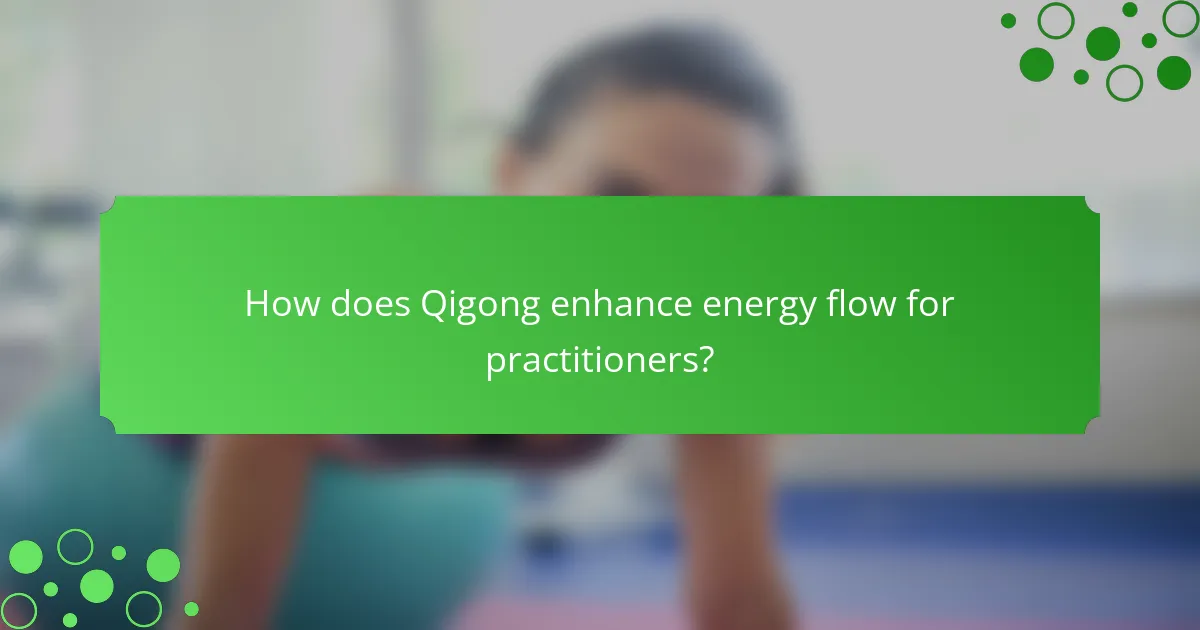
How does Qigong enhance energy flow for practitioners?
Qigong enhances energy flow by harmonizing the body’s internal systems, promoting relaxation, and reducing stress. This practice improves mental clarity and emotional balance, resulting in a sense of peace. Regular practitioners report increased vitality and improved overall well-being. Qigong’s unique attribute lies in its ability to integrate breath control, movement, and meditation, fostering a deep connection between mind and body. As a result, practitioners experience a significant boost in energy levels and mental tranquility.
What physiological mechanisms are involved in energy flow during Qigong practice?
Qigong practice enhances energy flow through various physiological mechanisms, including improved circulation, breath regulation, and neural synchronization. Enhanced circulation increases oxygen and nutrient delivery to cells, promoting energy production. Controlled breathing techniques regulate the autonomic nervous system, fostering relaxation and reducing stress. Neural synchronization aligns brain activity with bodily movements, improving mental clarity and focus. These mechanisms collectively support mental peace and overall well-being during Qigong.
Which Qigong techniques are most effective for improving energy circulation?
The most effective Qigong techniques for improving energy circulation include the Eight Pieces of Brocade, Tai Chi Qigong, and the Microcosmic Orbit. These practices enhance energy flow and promote mental peace.
The Eight Pieces of Brocade consists of eight exercises that target different body areas, improving flexibility and circulation. Tai Chi Qigong combines slow, deliberate movements with breath control, fostering relaxation and energy balance. The Microcosmic Orbit technique focuses on circulating energy through specific meridians, enhancing vitality and mental clarity.
Incorporating these techniques into a daily routine can significantly boost energy levels and promote overall well-being. Regular practice leads to improved mental peace and a deeper connection to one’s energy flow.
How does energy flow in Qigong compare to other holistic practices?
Energy flow in Qigong promotes balance and mental peace, distinguishing it from other holistic practices. Qigong focuses on cultivating internal energy, or “Qi,” through specific movements and breath control. Unlike practices such as yoga, which emphasize postures and flexibility, Qigong prioritizes energy circulation and relaxation.
Studies show that Qigong enhances mental clarity and reduces stress, similar to meditation but with a physical component. This combination allows for deeper relaxation and energy alignment. In contrast, practices like Tai Chi integrate martial arts principles, focusing on movement rather than static energy flow.
Qigong’s unique attribute lies in its accessibility; it can be practiced by individuals of all ages and fitness levels. This adaptability enhances its appeal compared to more physically demanding practices. Overall, Qigong offers a distinctive approach to energy flow, fostering mental peace through its holistic methodology.
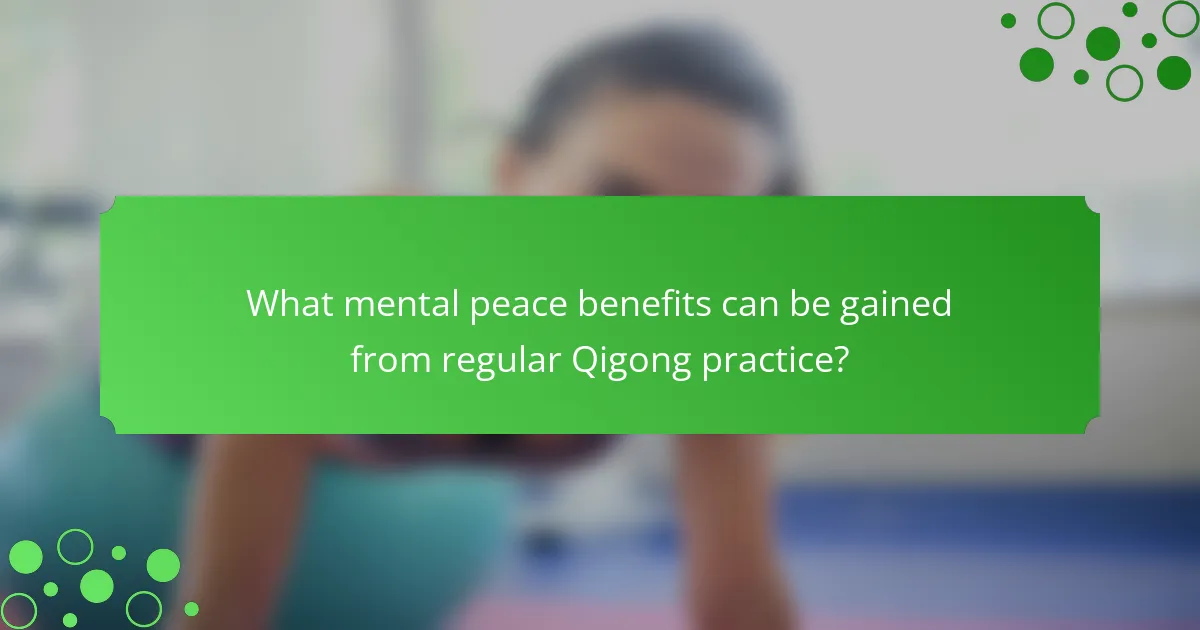
What mental peace benefits can be gained from regular Qigong practice?
Regular Qigong practice enhances mental peace by promoting relaxation, reducing stress, and improving emotional balance. It fosters a deeper connection between mind and body, leading to increased clarity and focus. Studies indicate that practitioners experience lower anxiety levels and improved mood stability. The unique attribute of Qigong lies in its gentle movements, which facilitate energy flow and create a calming effect on the mind. As a result, individuals often report a greater sense of tranquility and well-being.
How does Qigong influence stress reduction and emotional well-being?
Qigong significantly reduces stress and enhances emotional well-being through mindful movement and breath control. This practice promotes relaxation, balances energy flow, and fosters a sense of inner peace. Studies indicate that regular Qigong practice lowers cortisol levels, which are linked to stress. Additionally, participants report improved mood and resilience, contributing to overall mental health. The unique attribute of Qigong lies in its holistic approach, integrating physical, mental, and spiritual aspects for comprehensive wellness.
Which studies support the mental health benefits of Qigong?
Research supports the mental health benefits of Qigong through various studies demonstrating its effectiveness in reducing stress and anxiety. For instance, a meta-analysis revealed significant improvements in psychological well-being among participants practicing Qigong regularly. Another study highlighted that Qigong can enhance emotional regulation and decrease symptoms of depression, showcasing its role in promoting mental peace. Additionally, research indicates that Qigong facilitates energy flow, which can lead to improved mood and cognitive function. These findings collectively underscore Qigong’s potential as a therapeutic practice for mental health enhancement.
How can Qigong contribute to mindfulness and meditation practices?
Qigong enhances mindfulness and meditation by promoting energy flow and mental peace. This practice incorporates slow movements, focused breathing, and meditation techniques, fostering a deep connection between body and mind. As a result, practitioners experience reduced stress and improved emotional balance.
The rhythmic movements of Qigong stimulate the flow of Qi, or life energy, throughout the body. This energy circulation supports mental clarity and emotional stability, essential components of mindfulness. Regular practice can lead to a heightened state of awareness, enabling individuals to remain present and engaged in their experiences.
Studies indicate that Qigong can lower anxiety levels and improve overall well-being. Participants often report a sense of tranquility and increased resilience to stress. This unique attribute of Qigong makes it an effective complement to traditional meditation practices, enhancing their benefits.
Incorporating Qigong into daily routines can significantly enhance the effectiveness of mindfulness and meditation. Practitioners may find that their ability to focus and maintain a calm mind improves, leading to a more profound meditation experience.
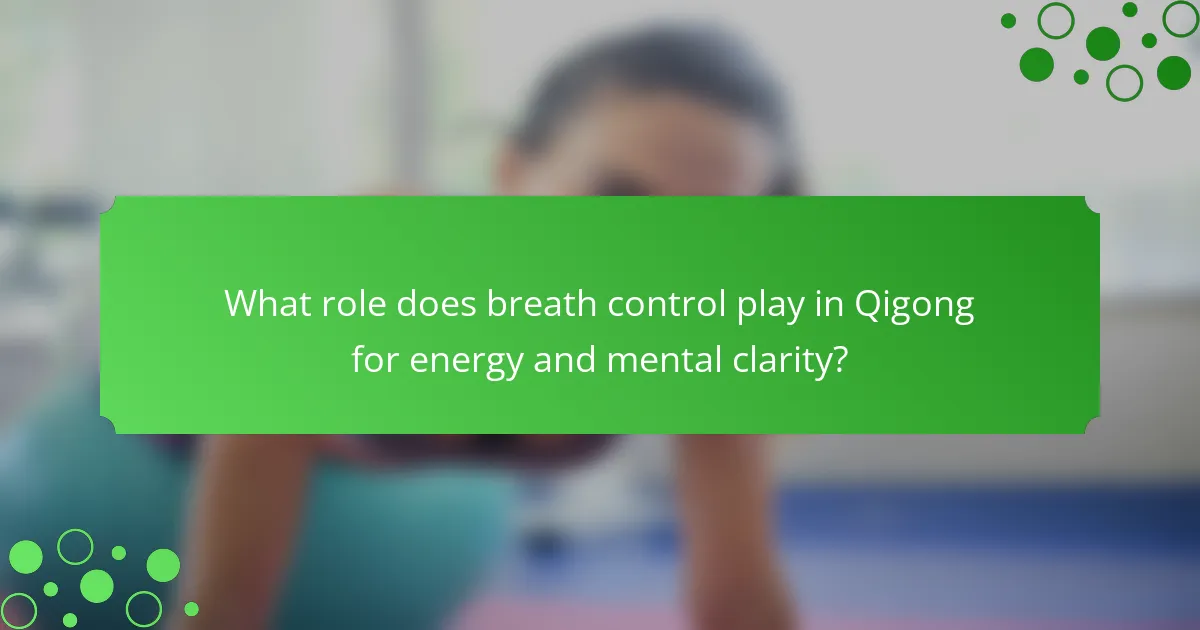
What role does breath control play in Qigong for energy and mental clarity?
Breath control is essential in Qigong for enhancing energy flow and achieving mental clarity. It regulates the flow of Qi, promoting relaxation and focus. Controlled breathing techniques help practitioners center their thoughts, reduce stress, and increase overall vitality. As a result, individuals experience improved mental peace and heightened awareness during practice.
How can specific breathing techniques enhance the effects of Qigong?
Specific breathing techniques can significantly enhance the effects of Qigong by promoting optimal energy flow and mental peace. Techniques such as diaphragmatic breathing and rhythmic inhalation help cultivate mindfulness, which is essential for deepening the practice. These methods increase oxygen intake, leading to improved vitality and relaxation. Additionally, controlled breathing can synchronize with Qigong movements, enhancing the connection between mind and body. As a result, practitioners often experience heightened emotional balance and reduced stress levels. Incorporating specific breathing techniques can thus amplify the overall benefits of Qigong, making the practice more effective for achieving mental tranquility and energy harmonization.
What are the common breathing patterns used in Qigong?
Common breathing patterns in Qigong include abdominal, chest, and reverse breathing. These techniques enhance energy flow and promote mental peace. Abdominal breathing encourages deep relaxation, while chest breathing increases energy levels. Reverse breathing, where the abdomen contracts during inhalation, aids in cultivating internal strength. Each pattern contributes uniquely to the overall benefits of Qigong practice.
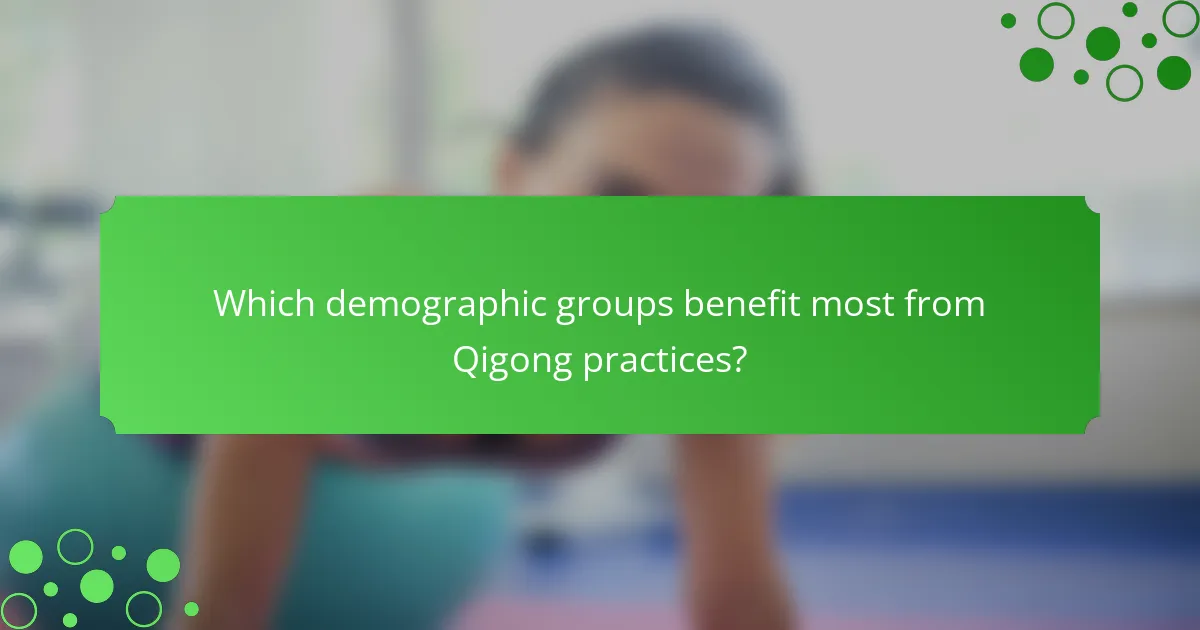
Which demographic groups benefit most from Qigong practices?
Older adults, individuals with chronic stress, and those seeking mental clarity benefit most from Qigong practices. These groups experience enhanced energy flow, reduced anxiety, and improved mental peace. Research indicates that older adults report significant improvements in balance and flexibility through regular Qigong practice. Additionally, individuals facing chronic stress find that Qigong helps lower cortisol levels, promoting relaxation. For those pursuing mental clarity, Qigong’s meditative aspects foster focus and emotional stability.
How do age and physical condition influence the benefits of Qigong?
Age and physical condition significantly influence the benefits of Qigong. Older adults may experience improved flexibility and balance, while younger individuals often gain enhanced energy and focus.
Physical condition also plays a role; individuals with chronic conditions may find Qigong beneficial for pain management and stress reduction. In contrast, those in good health may use Qigong to enhance overall well-being and mental clarity.
Research indicates that regular practice can improve energy flow and mental peace across age groups, but the specific benefits can vary based on individual health status and age.
What cultural perceptions affect the adoption of Qigong in different regions?
Cultural perceptions significantly influence the adoption of Qigong in various regions. In Western cultures, Qigong is often viewed through a lens of wellness and alternative medicine, emphasizing its benefits for energy flow and mental peace. Conversely, in Eastern cultures, particularly in China, Qigong is integrated into traditional health practices, viewed as a vital component of holistic health.
The perception of Qigong as a spiritual practice may hinder its acceptance in more secular societies. Additionally, misconceptions about its complexity or effectiveness can create barriers. In regions where mental health awareness is rising, Qigong’s potential for promoting mental peace and emotional well-being is increasingly recognized, leading to greater acceptance.
Educational initiatives and community programs can help shift perceptions, making Qigong more accessible. As a result, increased understanding can enhance its adoption, allowing individuals to experience its unique benefits for energy flow and mental clarity.
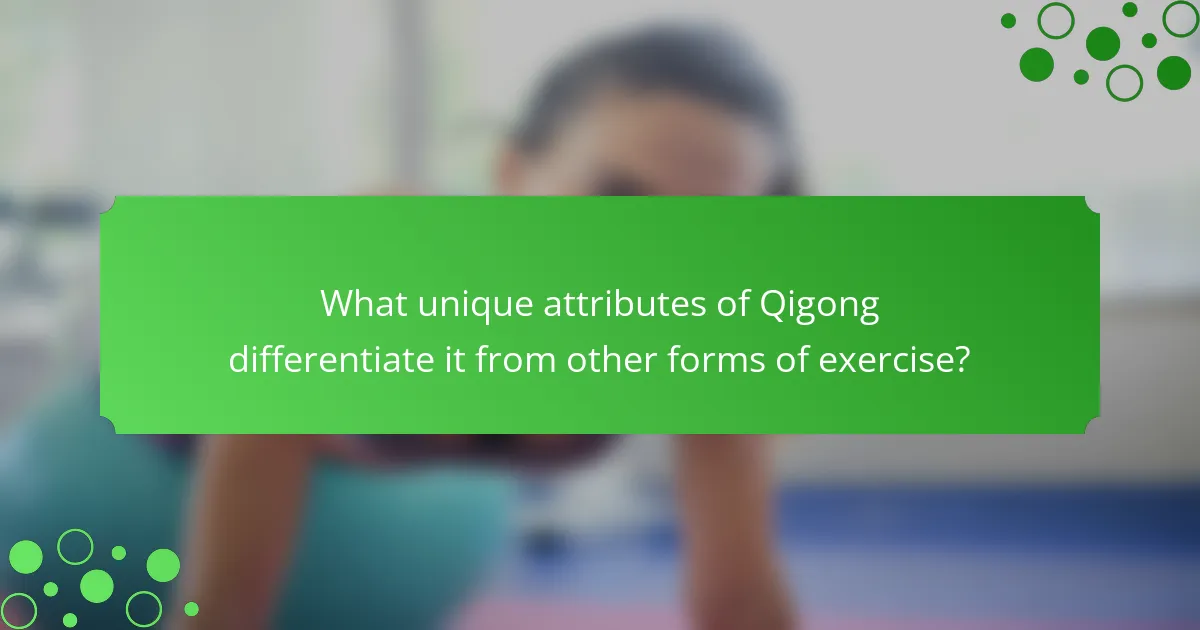
What unique attributes of Qigong differentiate it from other forms of exercise?
Qigong uniquely emphasizes energy flow and mental peace through its holistic approach to physical movement, breath control, and meditation. This practice promotes a deep connection between mind and body, enhancing overall well-being. Unlike other forms of exercise, Qigong incorporates specific techniques for cultivating internal energy, known as “Qi,” which is central to its practice. Additionally, the meditative aspect of Qigong sets it apart, fostering mental clarity and emotional balance, which are less emphasized in conventional workouts. This combination of physical, mental, and energetic benefits distinguishes Qigong from other exercise modalities.
How does Qigong integrate physical movement with spiritual elements?
Qigong integrates physical movement with spiritual elements by harmonizing breath, posture, and intention. This practice enhances energy flow, promoting mental peace and emotional balance. Movements are often slow and deliberate, fostering mindfulness and connection to the present. As a result, practitioners cultivate a deeper awareness of their body and spirit, enhancing overall well-being.
What are the rare techniques within Qigong that offer specialized benefits?
Rare techniques within Qigong that enhance energy flow and mental peace include “Iron Shirt Qigong,” “Bone Breathing,” and “Eight Pieces of Brocade.” These methods focus on unique practices that cultivate internal strength, optimize breath control, and promote profound relaxation.
Iron Shirt Qigong emphasizes grounding and protection of energy through body alignment and breathing techniques. This practice can enhance physical resilience and mental clarity.
Bone Breathing involves visualizing energy flowing into the bones, promoting deep relaxation and rejuvenation. This technique is known for its unique ability to strengthen the skeletal system while fostering a tranquil mind.
Eight Pieces of Brocade consists of a series of movements designed to balance the body’s energy and improve mental focus. This rare Qigong practice is effective for enhancing overall well-being and achieving mental peace.
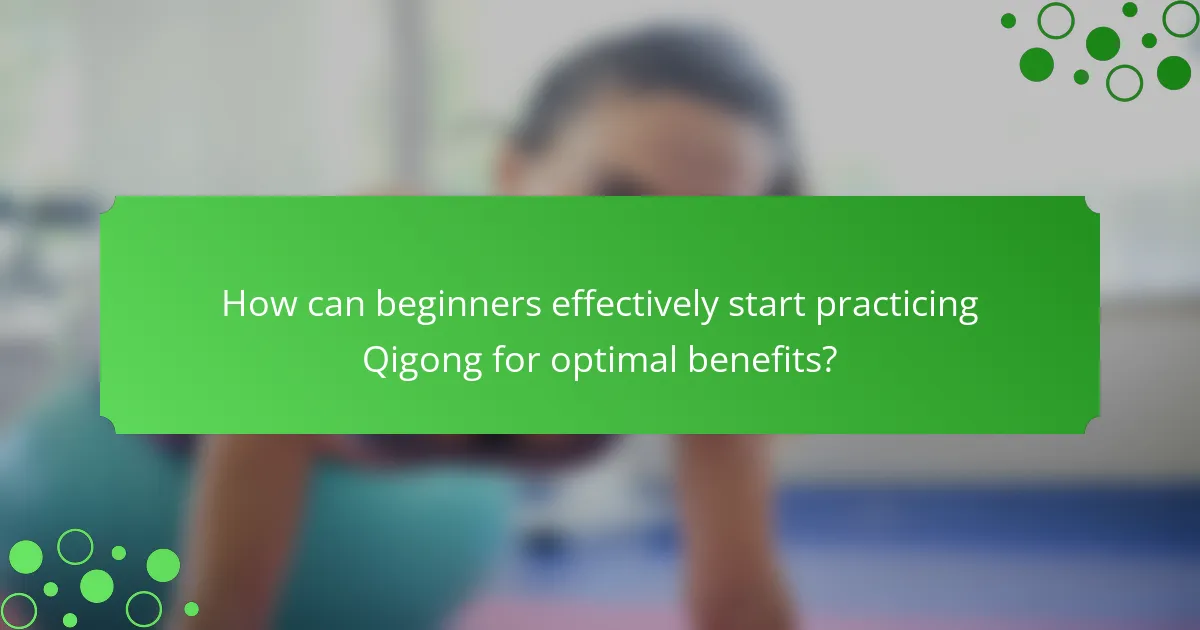
How can beginners effectively start practicing Qigong for optimal benefits?
Beginners can effectively start practicing Qigong by focusing on simple movements and breathing techniques for energy flow and mental peace. Start with short sessions, gradually increasing duration.
1. Choose a quiet space for practice.
2. Begin with basic postures like Wuji stance.
3. Incorporate deep, rhythmic breathing.
4. Focus on body awareness and relaxation.
5. Practice consistently, ideally daily.
These steps help cultivate energy and enhance mental clarity. Regular practice can lead to improved emotional balance and reduced stress.
What are the common mistakes to avoid when beginning Qigong?
To avoid common mistakes when beginning Qigong, focus on proper posture, breathing techniques, and consistency. Neglecting these can hinder energy flow and mental peace.
1. Ignoring posture can lead to discomfort and reduced effectiveness.
2. Inconsistent practice limits benefits and disrupts energy flow.
3. Overexertion may cause fatigue instead of enhancing mental peace.
4. Skipping breath awareness diminishes relaxation and focus.
5. Rushing through movements can prevent proper energy circulation.
Which resources or classes are recommended for new practitioners?
New practitioners can benefit from various resources and classes to enhance their Qigong practice. Look for local community centers or wellness studios that offer introductory Qigong classes. Online platforms like Udemy or Coursera provide structured courses focusing on energy flow and mental peace. Books by experienced Qigong masters can also deepen understanding and technique. Additionally, attending workshops or retreats can provide immersive experiences and personalized guidance.
What expert tips can enhance the Qigong experience for energy and peace?
To enhance the Qigong experience for energy and peace, focus on consistent practice, mindful breathing, and proper posture. Engaging in daily sessions, even for short periods, cultivates energy flow and mental clarity.
Incorporate nature into practice. Performing Qigong outdoors can amplify its calming effects. The natural environment enhances the connection to energy.
Utilize visualization techniques. Imagining energy flowing through your body can deepen the experience. Visualizing peace and tranquility promotes mental relaxation.
Stay hydrated. Adequate water intake supports overall energy levels and improves focus during practice. Aim for at least eight glasses daily for optimal benefits.